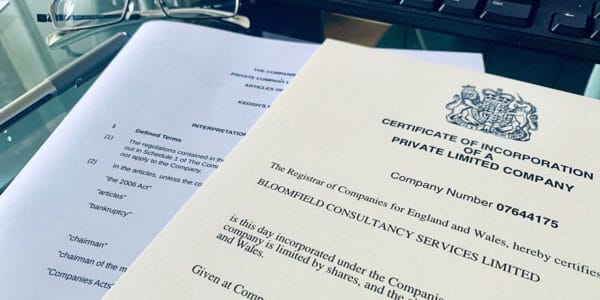To set up a limited company, you must provide information about the company itself, as well as the people who are going to be associated with it as directors, shareholders, and people with significant control.
In this article, we take a detailed look at all the information you will need to provide when setting up a company – some of which you will need to come prepared with, and some which can be selected during the set-up process.
Please note that the following details are for a private company limited by shares – the most popular type of company.
The company information needed to set up a company
Company name
Your first task is to pick an appropriate name for your new company. As you would expect, there are several rules in place when it comes to choosing a company name:
- It must be wholly unique and can’t be similar to any other name that currently exists on the Companies House public register
- It must end with ‘Limited’, ‘Ltd’ or the Welsh equivalents, ‘Cyfyngedig’ or ‘Cyf’
- It can’t be offensive
Furthermore, if your company name includes any sensitive words or expressions – such as ‘British’, ‘Health centre’ or ‘King’ – you must seek written approval from the relevant body. For example, if you use ‘NHS’, you will require permission from the Department of Health and Social Care. This approval can then be uploaded to your company formation application.
Check if your proposed company name is available by using our ‘Search’ tool, now. We’ll also let you know if it includes any sensitive words or expressions. If it does, we’ll notify you of who you need to contact to gain permission to use the word/expression.
Business activity
You need to provide Companies House with guidance on the type of business your company will be doing. This is done by selecting a Standard Industrial Classification (SIC) code from a list that you will be provided with. These are 5-digit codes that outline specific business activities.
There are over 600 codes that you can choose from, which you can filter by entering a keyword related to your business activity. You must select a minimum of one code, but you can choose up to four.
You should do your best to choose a code that reflects your activity; however, you will not be tied to this if your plans change.
Jurisdiction
Your company’s jurisdiction is where the company is based. This is dictated by the location of the registered office address (see below for more information about the registered office address).
There are four possible jurisdictions:
- England and Wales
- Wales only
- Northern Ireland
- Scotland
If the company’s registered office address is in England, you need to select ‘England and Wales’. Likewise, if the address is in Wales, you can select either ‘England and Wales’ or ‘Wales only’. If the address is in Northern Ireland, you must choose ‘Northern Ireland’, and if it’s in Scotland, you should choose ‘Scotland’.
Once the company has been formed, the jurisdiction is set. This means it cannot be changed, so whilst the registered office can be updated, it can’t move between jurisdictions.
Registered office address
As part of the company set-up process, you must state your registered office address. This is the physical address where government agencies (such as Companies House, HMRC, and the Information Commissioner’s Office) will send their correspondence.
A company does not need to conduct any trading activity from the address, nor do any company representatives need to be based at the address. Any address can be used as the registered office, provided that:
- It is based in the UK
- It is an ‘appropriate address’, as defined in the Companies Act 2006 (PO Boxes are not allowed)
- The owner of the property has given their permission
- Any official mail (such as the aforementioned correspondence from government bodies) is seen by the company directors
The registered office address is published on the Companies House public register, meaning it is easily and freely accessible to any interested party. Because of this, using a residential address as the registered office address is not recommended.
With our Registered Office Address Service (available for £39.00 +VAT), you can use our Covent Garden address as your company’s registered office address, and so shield your private address from the public register whilst boosting your company’s profile.
The service comes included with a number of our company formation packages or can be purchased separately.
Articles of association
For your company to be registered successfully, your application needs to be accompanied by an appropriate set of articles of association. This document sets out the rules that company directors must adhere to, and generally defines how the company should operate (for example, how internal decisions are made).
You won’t need to do anything regarding the articles of association, as we have drawn up a set that will be suitable for you and your company. All that’s required from you is confirmation that you wish to use these default articles.
The personnel information needed to set up a company
To set up your company, you must name:
- At least one director (directors oversee the running of the company)
- At least one shareholder (shareholders own the company)
- In most cases, at least one person with significant control (PSCs hold ultimate control in the company)
A company can be set up with just one person being named as the director, shareholder, and PSC. It can also be set up with multiple people – it’s up to you (however, the PSC is generally also a shareholder).
Director information
For every director you name, you must provide:
- Confirmation that the individual consents to being a director (this is done by ticking a box)
- Their title
- First name(s)
- Last name
- Date of birth
- Nationality
- Occupation
- Residential address – this is not published on the Companies House public register
- Service address – this is published on the Companies House register (we offer a Service Address facility that allows you to use our address. This can be purchased separately, but is also included with some company formation packages).
Shareholder information
For every shareholder you name, you must provide:
- Their title
- First name(s)
- Last name
- Date of birth
- Nationality
- Occupation
- Residential address – this is not published on the Companies House public register
- Service address – this is published on the Companies House register
- The answer to three security questions – you can choose from the following: mother’s maiden name, father’s forename, town of birth, telephone number, National Insurance number, passport number
You also need to give information about the shares that the shareholder is going to own. This includes:
- Quantity of shares
- Currency of shares
- Price per share
- Share particulars, if you want to deviate from the default particulars – these define the rights attached to the shares (for example, the right to vote and receive dividends)
About the shares you allocate
A limited company provides limited liability to its shareholders. This essentially means that shareholders are financially protected if the company were to be wound up. How liable shareholders are depends on the number of shares that have been allocated and the nominal value of these shares.
What’s more, how you allocate shares defines the ownership structure of your company. For example, if you allocate two shareholders with one share each, they will hold a 50%/50% stake in the company. If you have three shareholders and allocate two shareholders with one share each and another shareholder with two shares, they will have a 25%/25%/50 share split.
See this post for more information: Issuing shares when setting up a company – know your options
Person with significant control (PSC) information
For every PSC you name, you must provide:
- Their title
- First name(s)
- Last name
- Date of birth
- Nationality
- Occupation
- Residential address – this is not published on the Companies House public register
- Service address – this is published on the Companies House register
You must also provide information about the nature of control that the PSC has. This is given through answers to questions regarding:
- The ownership of shares (how much of the company does the PSC own?)
- The voting rights of their shares (what percentage of control do they have?)
- Whether or not they have the power to remove the board of directors
- Whether or not they have a controlling influence over a firm that will have a controlling influence on the company
- Whether or not they have a controlling influence over a trust that will have a controlling influence on the company
Whilst the company formation process is a relatively simple one, this is probably the most complex step. See this post for more information: People with significant control (PSCs) – who are they and what do they do?
That’s the information you need to set up a limited company
Once you have provided all of the necessary information, you will be able to submit your application.
If you have used Quality Company Formations to form your company, your application will be reviewed by a company expert before being sent to Companies House. They will check over the application to ensure there are no mistakes. If they are happy, your application will be sent to Companies House.
If there is an issue, they will be in contact with you to resolve it. Only when the issue has been resolved will the application be sent to Companies House.
Once sent to Companies House, it typically takes under 24 hours for the company to be formed. You will then be emailed the company registration number, memorandum and articles of association, share certificates, and company registers.
Ready to set up a limited company?
We offer a range of company formation packages, with prices starting at only £51.99.
Browse our company formation packages now
Thanks for reading, we hope you have found this post useful. Please leave a comment if you have any questions.
Please note that the information provided in this article is for general informational purposes only and does not constitute legal, tax, or professional advice. While our aim is that the content is accurate and up to date, it should not be relied upon as a substitute for tailored advice from qualified professionals. We strongly recommend that you seek independent legal and tax advice specific to your circumstances before acting on any information contained in this article. We accept no responsibility or liability for any loss or damage that may result from your reliance on the information provided in this article. Use of the information contained in this article is entirely at your own risk.














Join The Discussion